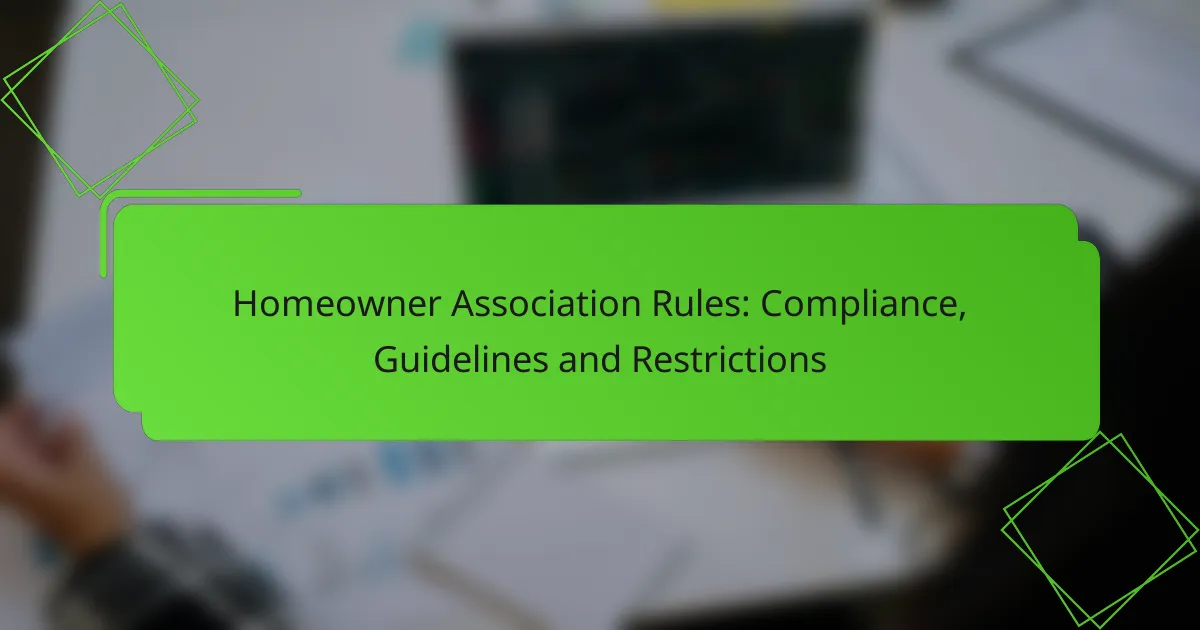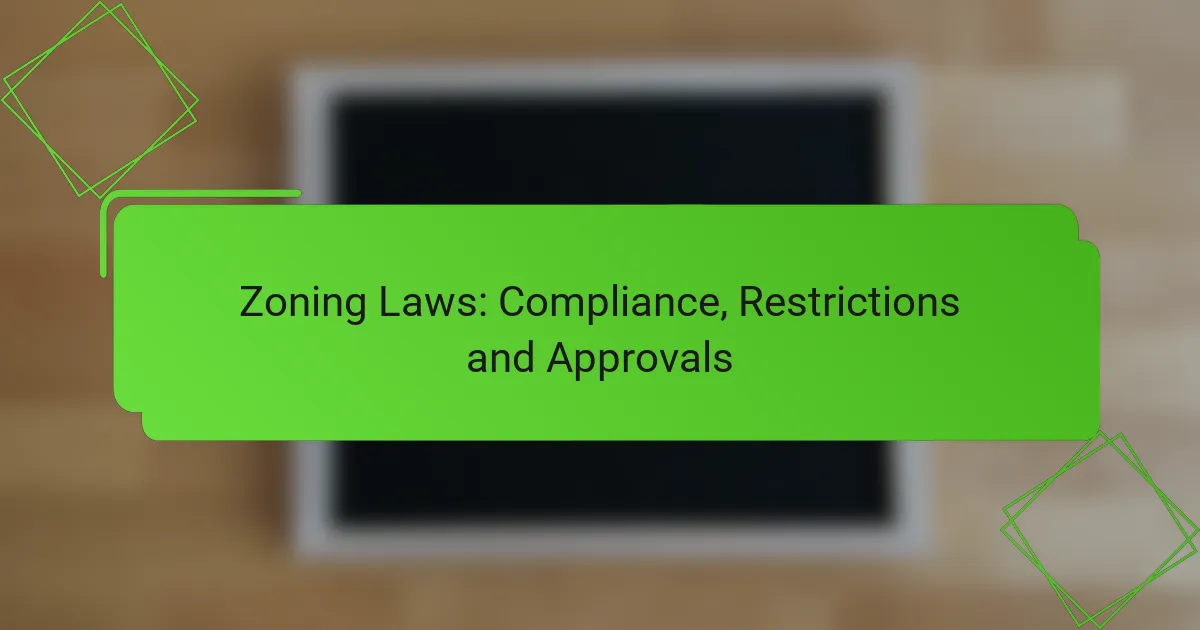Homeowner association (HOA) rules play a crucial role in preserving property values and fostering a cohesive community atmosphere. These guidelines address various aspects of community living, including property maintenance, noise control, and the use of shared spaces. Adhering to these rules is essential, as non-compliance can result in penalties and affect the overall harmony of the neighborhood.

What are the key homeowner association rules in Ireland?
Homeowner association (HOA) rules in Ireland are designed to maintain property values and ensure a harmonious living environment. These rules typically cover aspects such as property maintenance, alterations, noise levels, parking, and the use of common areas.
Property maintenance standards
Property maintenance standards require homeowners to keep their properties in good condition. This includes regular upkeep of gardens, exteriors, and any shared facilities. Neglecting maintenance can lead to fines or other penalties from the HOA.
Homeowners should familiarize themselves with specific maintenance guidelines, which may include requirements for landscaping, painting, and repairs. Regular inspections by the HOA may occur to ensure compliance.
No alterations without approval
Homeowners must seek approval from the HOA before making any significant alterations to their property. This includes changes to the exterior, such as adding extensions, fences, or altering the façade.
To avoid complications, homeowners should submit detailed plans and specifications for any proposed changes. The HOA typically has a set timeframe to respond, and failing to obtain approval can result in the requirement to revert the changes at the homeowner’s expense.
Noise and nuisance regulations
Noise and nuisance regulations are in place to ensure a peaceful living environment. Homeowners are generally prohibited from excessive noise that could disturb neighbors, particularly during late evening and early morning hours.
Common nuisances include loud music, parties, and disruptive behavior. Homeowners should be mindful of their activities and consider the impact on their neighbors to avoid complaints and potential fines.
Parking restrictions
Parking restrictions often limit where residents can park their vehicles within the community. Homeowners may be required to use designated parking spaces or may face penalties for parking in unauthorized areas.
Some HOAs may also have rules regarding the types of vehicles allowed, such as prohibiting commercial vehicles or trailers. Homeowners should review the specific parking guidelines to ensure compliance and avoid fines.
Common area usage guidelines
Common area usage guidelines dictate how shared spaces, such as parks, pools, and clubhouses, can be used by residents. These areas are intended for the enjoyment of all homeowners, and specific rules may govern their use to prevent overcrowding or damage.
Homeowners should be aware of any reservation requirements for common facilities and adhere to posted rules regarding hours of operation and conduct. Violating these guidelines can lead to restrictions on access to these shared spaces.
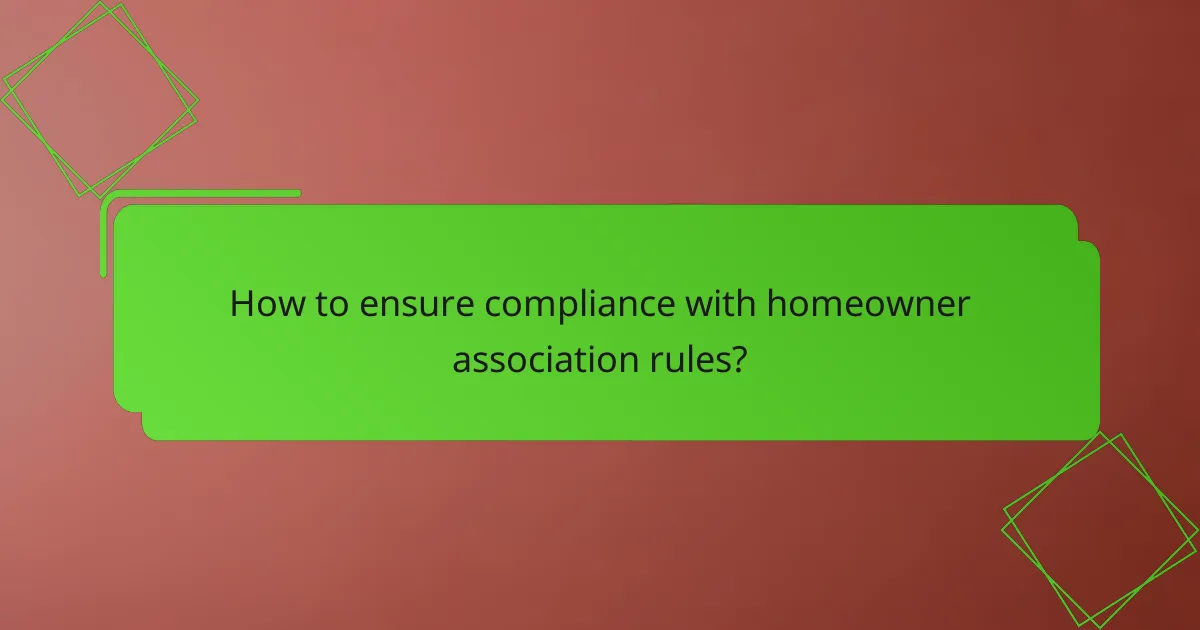
How to ensure compliance with homeowner association rules?
Ensuring compliance with homeowner association (HOA) rules involves clear communication, established enforcement procedures, and regular inspections. These practices help maintain community standards and foster a cooperative environment among residents.
Regular communication with members
Effective communication is crucial for ensuring that all members understand the HOA rules and guidelines. Regular newsletters, emails, or community meetings can keep residents informed about any changes or reminders regarding compliance.
Consider creating a dedicated online platform or forum where members can ask questions and discuss concerns. This transparency fosters a sense of community and encourages adherence to the rules.
Establishing clear enforcement procedures
Clear enforcement procedures are essential for maintaining compliance with HOA rules. Establish a written policy that outlines the consequences of violations, including potential fines or corrective actions.
Ensure that these procedures are communicated to all members and consistently applied. This helps prevent misunderstandings and ensures that all residents are treated fairly when issues arise.
Conducting periodic inspections
Periodic inspections of the community can help identify rule violations before they escalate. Schedule these inspections regularly, such as quarterly or bi-annually, to ensure ongoing compliance with HOA standards.
After inspections, provide residents with feedback and a timeline for addressing any violations. This proactive approach not only helps maintain property values but also reinforces the importance of following HOA rules.
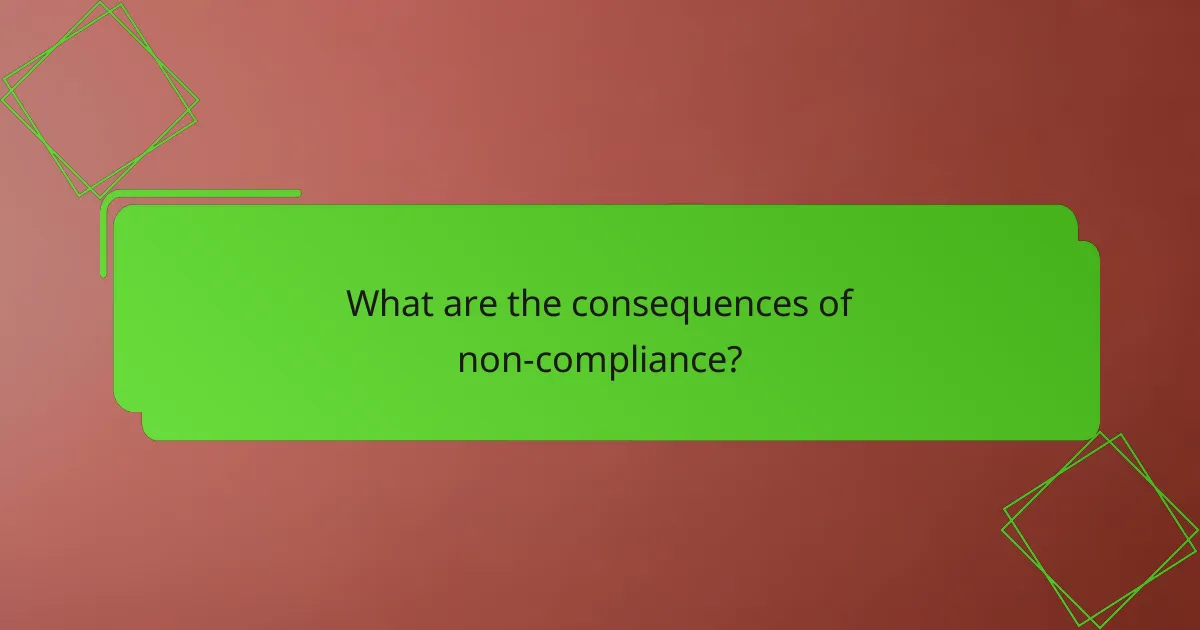
What are the consequences of non-compliance?
Non-compliance with homeowner association (HOA) rules can lead to various consequences, impacting both the homeowner and the community. These repercussions often include financial penalties, potential legal actions, and restrictions on community privileges.
Fines and penalties
Homeowners who fail to adhere to HOA rules may face fines, which can vary widely depending on the severity of the violation. Typically, fines can range from low tens of dollars for minor infractions to several hundred dollars for more serious breaches. Associations usually have a structured fine schedule outlined in their governing documents.
It is crucial for homeowners to review their HOA’s specific rules regarding fines, as repeated violations may lead to increased penalties. Timely payment of fines is essential to avoid additional charges or further action by the association.
Legal action by the association
If fines remain unpaid or violations persist, the HOA may pursue legal action against the homeowner. This can include filing a lien against the property, which may affect the homeowner’s ability to sell or refinance. Legal fees can accumulate quickly, adding to the financial burden.
Homeowners should be aware that legal action is often a last resort for associations, typically reserved for serious or repeated violations. Engaging in open communication with the HOA can sometimes resolve issues before they escalate to this level.
Loss of community privileges
Non-compliance can also result in the loss of community privileges, such as access to shared amenities like pools, gyms, or clubhouses. These restrictions are often enforced to encourage adherence to community standards and can be a significant inconvenience for homeowners.
To avoid losing privileges, homeowners should stay informed about their HOA’s rules and actively participate in community meetings. Understanding the guidelines can help prevent violations and maintain access to community resources.
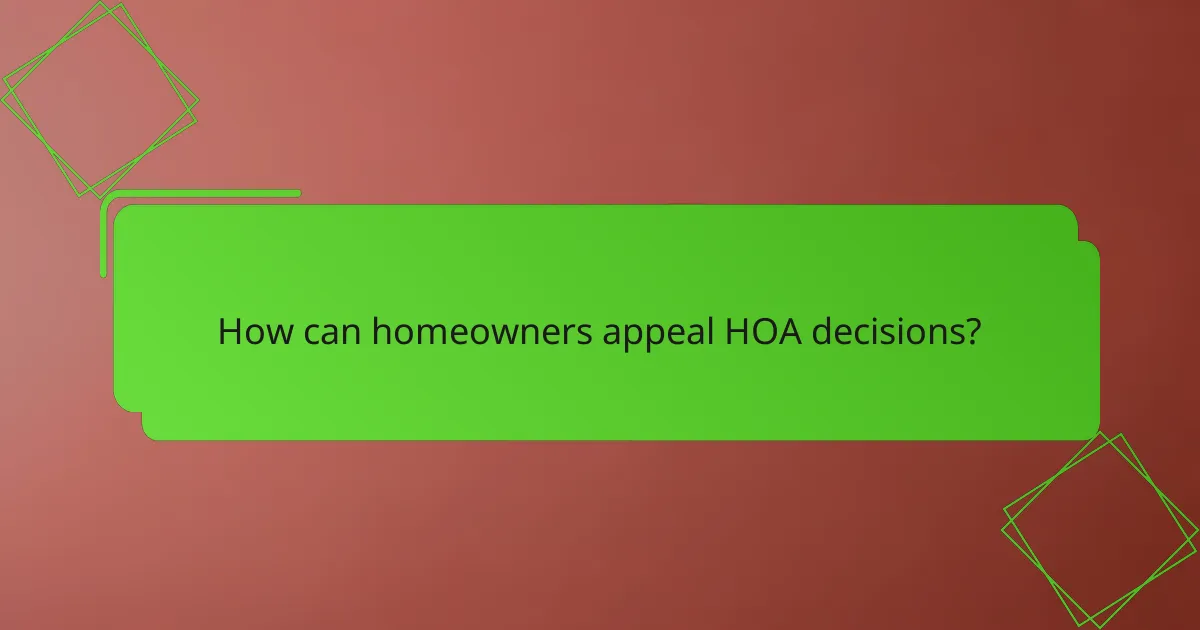
How can homeowners appeal HOA decisions?
Homeowners can appeal HOA decisions by following specific procedures outlined in their association’s governing documents. This process typically involves submitting a formal appeal, requesting a hearing, or engaging mediation services to resolve disputes.
Submitting a formal appeal
To submit a formal appeal, homeowners should first review their HOA’s bylaws to understand the required steps and deadlines. Generally, this involves writing a letter that clearly states the reasons for the appeal and any supporting evidence.
It’s advisable to keep the appeal concise and focused, addressing specific violations or decisions made by the HOA. Homeowners should submit their appeal to the designated board member or committee, ensuring it is done within the timeframe specified in the governing documents.
Requesting a hearing
Homeowners can request a hearing to present their case in person before the HOA board. This typically requires submitting a written request that outlines the issues at hand and the desired outcome.
During the hearing, homeowners should prepare to discuss their appeal and provide any relevant documentation. It’s beneficial to remain respectful and professional, as this can influence the board’s decision-making process.
Engaging mediation services
If direct appeals and hearings do not yield satisfactory results, homeowners may consider engaging mediation services. Mediation involves a neutral third party who facilitates discussions between the homeowner and the HOA to reach a mutually agreeable solution.
Many HOAs encourage mediation as a cost-effective alternative to litigation. Homeowners should check if their association has specific mediation protocols or preferred mediators to streamline the process.
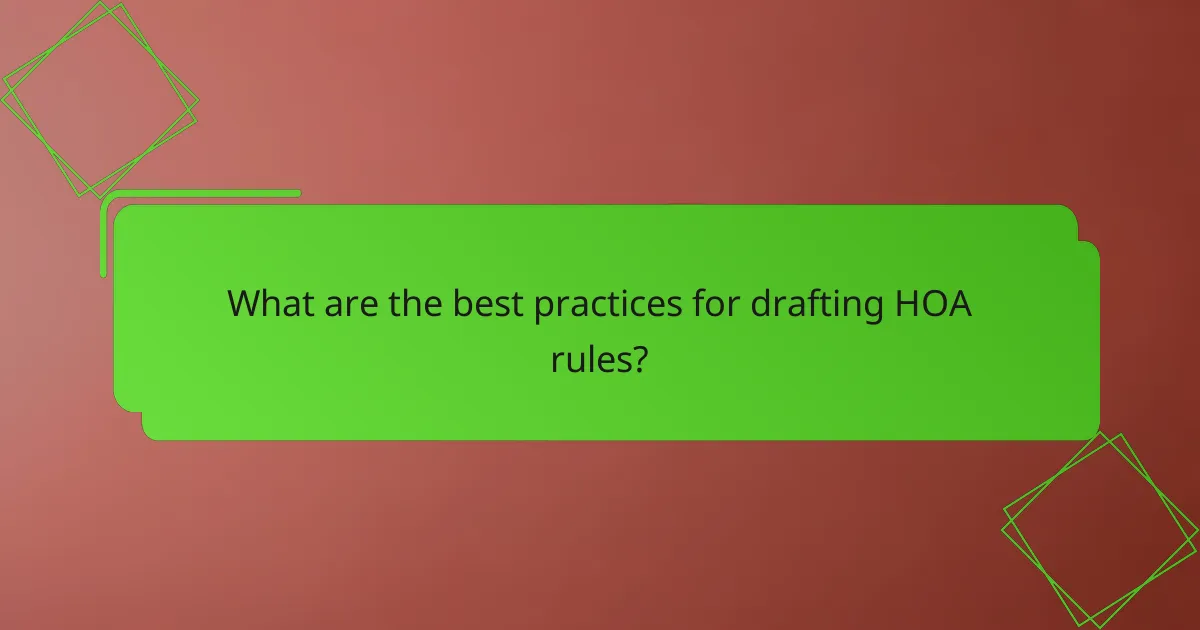
What are the best practices for drafting HOA rules?
Best practices for drafting Homeowner Association (HOA) rules include clarity, consistency, and community involvement. Effective rules should be easy to understand, enforceable, and reflective of the community’s values and needs.
Clarity and Simplicity
HOA rules should be written in clear and straightforward language. Avoid legal jargon and complex terms that may confuse residents. For example, instead of saying “residential structures must adhere to aesthetic guidelines,” specify “houses must be painted in approved colors.”
Using bullet points or numbered lists can enhance readability. This format allows residents to quickly grasp the key points without wading through dense paragraphs.
Consistency with State Laws
Ensure that HOA rules align with local and state regulations. Familiarize yourself with relevant laws governing property management and community associations in your area. This can prevent legal disputes and ensure enforceability.
For instance, if your state has specific regulations regarding pet ownership, your HOA rules should reflect those standards to avoid conflicts. Regularly review and update rules to stay compliant with any changes in legislation.
Community Involvement
Engaging community members in the drafting process fosters a sense of ownership and acceptance of the rules. Hold meetings or surveys to gather input on proposed regulations. This can lead to more relevant and widely accepted guidelines.
Consider forming a committee of residents to oversee the drafting process. This group can represent diverse perspectives and ensure that the rules reflect the community’s values and needs.
Regular Review and Updates
HOA rules should not be static; they require regular review and updates to remain relevant. Schedule annual reviews to assess the effectiveness of the rules and make necessary adjustments based on community feedback and changing circumstances.
Document any changes clearly and communicate them to all residents. This transparency helps maintain trust and compliance within the community.
